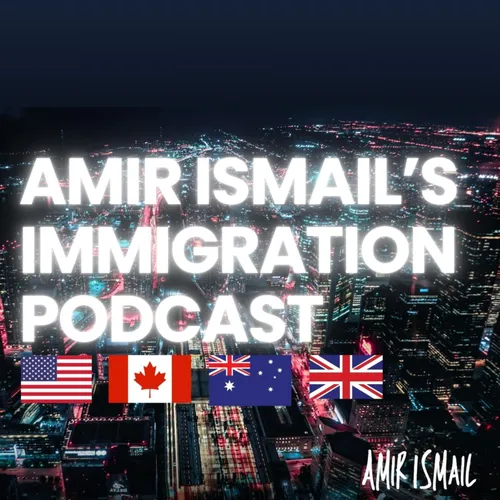Canadian Immigration in Post Trudeau Era
- Author
- Amir Ismail
- Published
- Fri 10 Jan 2025
- Episode Link
- https://podcasters.spotify.com/pod/show/amirismailimmigration/episodes/Canadian-Immigration-in-Post-Trudeau-Era-e2ta301
In this video, we discuss Justin Trudeau's Resignation and Its Impact on Canadian Immigration Policy
Justin Trudeau's resignation as Canada's Prime Minister signals a pivotal moment for the nation's immigration policies. Known for ambitious immigration targets and a welcoming stance, his tenure has faced growing public and geopolitical challenges. How will his departure reshape Canada's immigration landscape?
Key Highlights of Trudeau’s Immigration Policy:
Pro-Immigration Leadership: Trudeau championed high immigration levels, attracting over 450,000 newcomers annually to address labor shortages and foster economic growth.
Public Pushback: Strains on housing, healthcare, and infrastructure led to diminished public support for these targets.
Policy Adjustments: The government introduced caps on international student permits, stricter work permit rules, and reduced immigration targets in response to public unease.
Major Changes Impacting International Students:
Study Permit Reductions: A 35% decrease in approvals and a suspension of the Student Direct Stream (SDS) program caused visa delays, impacting students from India and other countries.
Financial Burdens: Proof of funds requirements for study permits doubled, creating challenges for many applicants.
Work Permit Reforms: Private college graduates face ineligibility for Post-Graduation Work Permits (PGWPs).
Express Entry and Job Offer Points:
Upcoming Changes: By Spring 2025, arranged employment points will no longer be awarded in Express Entry profiles, a move to combat fraud and prioritize skill-based immigration.
Continuity in Operations: Immigration, Refugees, and Citizenship Canada (IRCC) is expected to maintain normal operations despite political transitions.
Geopolitical Pressures and U.S. Relations:
India-Canada Tensions: Ongoing diplomatic disputes have delayed visa processing for Indian applicants, making Canada less appealing to some.
U.S. Tariff Threats: The Trump administration has proposed tariffs on Canadian goods if border security and immigration policies aren't tightened, adding external pressure.
Future of Canadian Immigration Policy:
The next leader's approach will be crucial:
Chrystia Freeland: Likely to emphasize economic immigration while addressing public concerns about housing and infrastructure.
Mark Carney: May adopt a data-driven, targeted strategy to align immigration with labor market needs and long-term planning.
Public Sentiment and Integration Challenges:
Public attitudes have shifted, with growing skepticism about immigration’s benefits due to infrastructure and service gaps. Future policies will need to balance economic imperatives with integration concerns to regain public trust.
Immediate Impacts Post-Trudeau:
No Sudden Policy Overhaul: IRCC operations, including Express Entry draws, will continue as usual.
Legislative Delays: Parliamentary prorogation may slow policy reforms.
Collaboration with the U.S.: The incoming government must address U.S. concerns on immigration and border security.
Conclusion:
Justin Trudeau's resignation marks a turning point for Canada’s immigration policies. While immediate changes may be limited, the long-term impact depends on his successor’s vision, public opinion, and external factors like U.S. pressure. Canada’s new leadership faces the challenge of maintaining its reputation as a global destination while addressing pressing domestic concerns.
📌 Related Links:
Stay informed about the latest developments in Canadian immigration and what they mean for you:
► Explore Canada Immigration Options - www.amirismail.com
► Book a Consultation - www.amirismail.com/book-a-consultation
Let’s Connect:
► WhatsApp or Call: +1 (647) 835 0660 | 416 913 0230
► Follow on Instagram: @amirismail
Subscribe to the channel for expert analysis on Canadian immigration policies and updates.
#JustinTrudeau #CanadaImmigration #amirismail #CanadianPolitics
